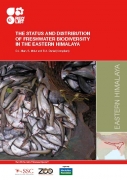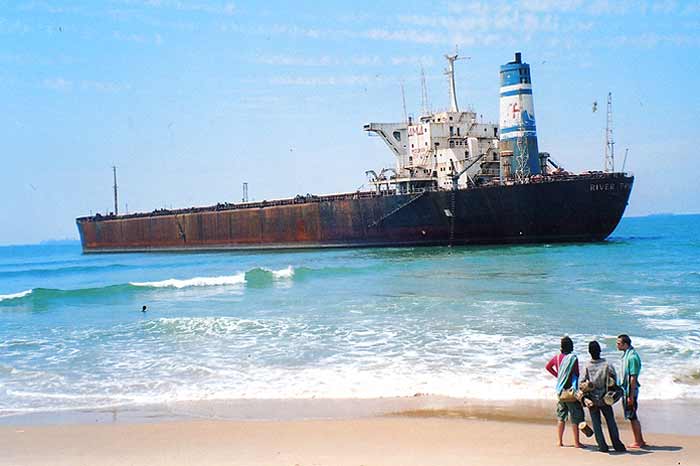Ecology and Environment
Yale University releases Environmental Performance Indices for 2010
Posted on 30 Jan, 2011 11:47 PMThis website by the Yale University provides information on the global and countrywise ratings for environmental performance in the form of Environmental Performance Indices (EPI) for different countries. The site also provides details of EPI scores for India in comparison with the average scores globally.
This index was developed from the Pilot Environmental Performance Index, first published in 2002, and designed to supplement the environmental targets set forth in the U.N. Millennium Development Goals (http://en.wikipedia.org/wiki/Environmental_Performance_Index)
The need for creating a River Act - Anupam Saraph
Posted on 28 Jan, 2011 06:30 PMRivers, streams and lakes are the vital link in the water cycle that ensure that life as we know it can continue to flourish on earth. Unfortunately, as Dr Rajendra Singh points out, there is no river in India that has been spared from encroachment and pollution. The massive Ganga Action Plan has failed to clean the Ganges.
The status and distribution of freshwater biodiversity in the eastern Himalaya – A report by IUCN
Posted on 28 Jan, 2011 07:08 AM One of the main reasons cited for inadequate representation of biodiversity is a lack of readily available information on the status and distribution of inland water taxa.
One of the main reasons cited for inadequate representation of biodiversity is a lack of readily available information on the status and distribution of inland water taxa.
In response to this need for information, the IUCN Species Programme, in collaboration with Zoo Outreach Organisation (ZOO) conducted the Eastern Himalaya Freshwater Biodiversity Assessment, a review of the global conservation status of 1,073 freshwater species belonging to three taxonomic groups – fishes (520 taxa), molluscs (186 taxa), and odonata (dragonflies and damselflies) (367 taxa).
Other groups that include freshwater species that have been comprehensively assessed are freshwater crabs (assessed in 2008, and 57 species of crab are present within the assessment region), mammals, birds, and amphibians and their assessments can be accessed on the IUCN Red List.
Regenerating natural resources and rural livelihoods in rainfed areas of India: A civil society consultation by WASSAN to discuss priorities for the twelfth five year plan
Posted on 26 Jan, 2011 09:13 PM A civil society consultation was held on “Regenerating natural resources and rural livelihoods in rainfed areas of India” by WASSAN at Hyderabad in December 2010 to discuss priorities for the twelfth five year plan. The Planning Commission, Government of India has been steering the process of development in India by conceptualizing five year plans and had sought inputs from civil society organizations, activists groups, networks of CBOs / NGOs, donors and others for preparing an approach paper for twelfth plan.
A civil society consultation was held on “Regenerating natural resources and rural livelihoods in rainfed areas of India” by WASSAN at Hyderabad in December 2010 to discuss priorities for the twelfth five year plan. The Planning Commission, Government of India has been steering the process of development in India by conceptualizing five year plans and had sought inputs from civil society organizations, activists groups, networks of CBOs / NGOs, donors and others for preparing an approach paper for twelfth plan.
The objective of the consultation workshop was to contribute to the process of defining broad contours of twelfth plan with a focus on rural livelihoods the thrust area being policy framework, funding support, institutional arrangements etc., by -
- Consolidating the lessons from good practices in promoting and protecting rural livelihoods in the country, that could be integrated in twelfth five year plan.
- Systematically articulating issues and concerns (bottlenecks) in promoting and protecting rural livelihoods, which could be addressed in the twelfth five year plan.
Volunteering opportunity in a wetlands project near Hampi
Posted on 24 Jan, 2011 06:41 PMThis pond and wetland is the first stage of creating a wildlife field station and research center for WildlifeSOS in Ramdurga Valley.
The wetland will be both for habitat and as a safe water source for wildlife. Concurrent with the construction of the wetland will be the design process for the field station and site. Volunteers will assist in both these processes with the primary task of completing construction of the wetlands. Long afternoon breaks and evening's slow relaxation will be time for learning, discussions and wandering conversations. Areas of discussion may include: Permaculture basics (principles, flows, patterns, zonation), site analysis, water, soil, plants and cropping, animals systems, appropriate technology, invisible structures (economic, cultural and social systems), design and local to global sustainability.
Short course on geostatistical analysis of environmental data, ICRISAT, 21st - 25th Feb 2011, Andhra Pradesh
Posted on 24 Jan, 2011 04:49 PMForwarded to the portal by: Dr.Yaduraju, ICRISAT
 Organizer: International Crops Research Institute for the Semi-Arid Tropics (ICRISAT)
Organizer: International Crops Research Institute for the Semi-Arid Tropics (ICRISAT)
Venue: Patancheru, Andhra Pradesh, India
Training course on livelihood enhancement through sustainable natural resource management in drylands, ICAR, 17th Feb to 2nd Mar 2011, Hyderabad
Posted on 24 Jan, 2011 12:33 PMOrganizer: Indian Council for Agricultural Research
Venue: Central Research Institute for Dryland Agriculture (CRIDA), Santoshnagar, Hyderabad
Internet Course on Environmental Management, IISC
Posted on 24 Jan, 2011 11:31 AMCourse Content:
This course provides an overview of the key concepts and principles in environmental management, areas of global and national environmental concern, and strategies and tools for effective environmental management. Attempt to understand the genesis of environmental problems; the concerns that lead to various international and national initiatives to tackle them have been made in this course. Various tools, which can be used to address environmental problems and the role that the professionals can play in managing environment in their respective areas would be discussed.
- Principles of Environmental Management
- Principles of Ecology, Environment & Environmental Management.
- Policies and Legal Aspect of Environmental Management
Environment audit report - Comptroller and Auditor General of India (CAG) (2010-2011)
Posted on 22 Jan, 2011 07:22 PMThis document by the Comptroller and Auditor General of India (CAG) includes an audit report, which highlights issues related to adequacy, effectiveness of programmes, schemes, interventions made by the Ministry of Environment and Forests to tackle important environmental issues like deforestation, biodiversity and pollution control.
It aims at sensitising policy makers to look at environmental issues with a holistic approach and address deficiencies in programmes/schemes/policies so that the environment can be conserved effectively.
Towards ruin: Regularisation rather than regulation has become the norm in our coastal policy at present, which is actively undoing one of India’s most significant environmental regulations - Claude Alvares
Posted on 21 Jan, 2011 03:58 PM
MV River Princess Stranded for 10 years now, the grounded ship has been wreaking ecological havoc on Candolim beach in Goa
Indira Gandhi’s concerns about protecting the ecology of India’s coasts, which held sway for almost 20 years, are being subverted under a regime supervised by her daughter-in-law and grandson.




